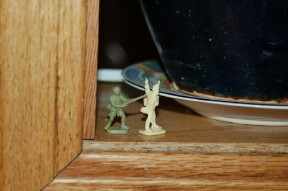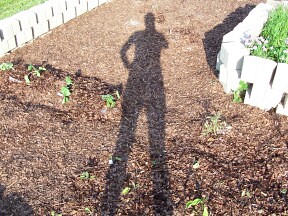Call of the Sirens (Part VI)
(Oh, and if curious, here's a view of OHSU today. The skybridge to the right of center connects part of University Hospital to the blue Veteran's Hospital.)
----------
So, internal medicine it was to be. I don't think my stomach stopped churning the whole of the three months. The first half was spent, again, over at the University Hospital, this time on the cardiology service, which meant that we not only did regular general medical admissions, but also covered the Cardiac Care Unit and had double attending rounds.
Let's take a minute and discuss 'rounds'. Rounds are to medicine as dough is to bakers. There are endless varieties of rounds, some of which are truly endless. You start your day, if an underling, doing pre-rounds, usually about 6-7 am (5-6 am if on a surgical service). That's where you fly around to all the patients on your inpatient service and make sure they're all alive and nothing horrible, like a cardiac arrest or a transfer to the Intensive Care Unit happened over night, if you were not on call (and therefore theoretically left the hospital for a few hours to sleep and perhaps see something of a loved one or two). If you were on call, presumably you'd know all this and therefore would pre-round on those patients who were unstable or newly admitted over night to make sure they'd live a few hours more.
After Morning Report, came work rounds, where you stomped around the wards and did the actual work for an hour or two. Work such as examining your patients, garnering lab and radiology reports, calling in consultants, writing chart notes, speaking to families, doing procedures, dictating admission, procedure or discharge notes, etc. New admissions from the night before, if transferred to your service because they were recently discharged by your service and re-admitted with a similar problem, like congestive heart failure exacerbation ('bounce backs'), were re-evaluated by the receiving team, patients discharged (hopefully to remain out of the hospital for the magic 2 weeks, so they were no longer under the 'bounce back umbrella'), and new admissions that came in during the morning to the day admission team were worked up. All this in just a couple of hours.
Later in the morning, or sometimes in the afternoon, were Attending Rounds. Each medical service (usually consisting of 1 resident, 2 interns and 2 students) had an attending physician, who was ultimately responsible for all the patients on the teaching service. During attending rounds, each patient was discussed and the plans were laid. All new patients were presented in depth, usually by the med student or the intern assigned to the case, and lots of pimping was done. Pimping is the time-honored tradition in which a senior medico asks questions designed to teach, instruct or downright humiliate the junior medicos, usually done in a group for maximum degradation. ("So! Dr Piffle! Give me the 5 mechanisms by which serum calcium may be elevated in multiple myeloma." "Ummmmm...Errrrrrrrrr...") Attending rounds were often done at the bedside and were particularly painful after the 24th hour of sleeplessness. (That's what you're seeing on a medical TV show when the whole damn team troops to the patient's bedside and one junior team member starts talking about the poor sick soul in front of them: "Mrs Muskox is a 67 year-old woman with a history of ovarian cancer who presented to the ER last night with a 6 week history of heavy vaginal bleeding and shortness of breath.") Often they go on for a couple of hours, minimum, except neurology attending rounds which usually went for 4-5 hours or surgical attending rounds, which were often less than 5 minutes, if they took place at all. If your feet are lucky, the attending is happy to conduct most of the rounds in the team office, in chairs. If not, you will rue wearing anything but the cushiest of shoes, and even they will be of little comfort after the second hour.
If you had time and there were no really-really sick people to attend to, you'd get to go to Noon Conference, with your actual non-cookie lunch, where someone would stand up (and not eat their own lunch) and yammer on for an hour about the renal tubular acidoses (Yes, I chose to talk for an hour on that very subject, once. Never again.) or the various treatments for esophageal varices or what-have-you. Usually, you'd sit there blissfully slack-jawed and zone out, letting the knowin' wash over and beyond you. If Noon Conference were presented by an attending known for pimping, you'd sometimes opt for plan B, which was to grab some lunch in the cafeteria and keep on working, because who the hell needs the stress of being pimped while eating? Often, however, if your team was on call, you'd have no choice but plan C, which was plan B without the lunch, unless you still had your cookie in your pocket, and then you hoped that you were eating your cookie lunch and not your cookie dinner, because breakfast was a long way in the uncertain future and the cafeteria closed by 7 pm. If you weren't on call, you'd go home sometime in the evening, prep for the next day by reading from your 20 lb (10 kg) tome of internal medicine, doing your many-page write-up, and memorizing every last thing you could for the next day's presentation during attending rounds in the vain attempt to look less shtoopid.
Typically, there were 4 medicine teams and so call rotated every 4th night, so in a typical 4 day rotation, you'd be in the hospital 60 hours out of every 84. Generally, as a student you'd get 3 days off a month and as an intern or resident, it'd be 1-2 days off a month. If your team were on call, then you didn't leave the hospital until the next evening, about 36 hours after entering the hospital. Depending on the dress policy of the hospital you were working in, at some point you'd change into scrubs, the better to slop around and be slopped on, and give yourself over to 'the zen of call', trying to just flow with it. Usually this would be short lived as you started to fold under an avalanche of admissions. It wasn't so bad as a student, as you'd usually concentrate on just one or two patients and tag along with the rest for the ride. As you didn't know as much as as, well, anyone else, including the housekeepers and the guy who filled the vending machines, you had to do a lot of looking things up in textbooks and journals (this was just before the internet was coming into use).
It is at this point that we must point out that our heroine was a less-than-impressive medical student. Filled to the brim with compassion and an interest in the subject of sick folk, she was a mousy, timid, oh-so-unimpressive lump of a thing. Presenting a case left me wanting a toilet in which to empty my gastric and colonic contents. As a result, one of the cardiology attendings I was under at the University Hospital (admittedly rather a jerk) told me at the end of his stint with me that I'd never make a good physician and I should just cut my losses and quit med school. I was mortified and crushed. And then I was pissed. What an asshole. To this day, seeing the combination of a man with slicked-back hair wearing a cashmere turtleneck with a camel hair blazer is enough to make me want to run over and hurl both insults and eggs at him.
And so ended that month and a half at The U, and it was time to change venues to the Veteran's Hospital, across the way. At that point the building was all shiny clean and new, having opened only a year or so prior. It was still a vast government bureaucracy, though, with everything done in triplicate and 4 patients per room. The nurses ruled the roost and if a task was not something specifically in their job description, the request was met with an icy stare and maybe a smirk. But! It was filled with the most spectacular patients ever. There were a few ancient WWI vets, all in their 90s. Many, many WWII and Korean War (oops, make that Korean Conflict as we apparently don't consider that a war) vets with a mind boggling array of illnesses, most having at least 5-6 severe problems all together, like coronary disease with emphysema and kidney failure, a history of cancer(s) (usually lung, colon, and/or prostate) with a frosting of pneumonia or endocarditis or decompensated cirrhosis of the liver or all of the above. The youngish (this was almost 20 years ago, remember) Vietnam vets were mostly tragic, though, as they often were AIDS patients in the early years of the disease and there wasn't much we could do for them but treat the opportunistic infections and try to stave off the inevitable. Many of them were very angry, bitter men; a combination of ill usage from the war and the disease. All but the Vietnam vets were more than willing to let a 10-thumbed med student do any procedure on them or to spend 4 hours taking a detailed history and physical. "You need to do a 5 vessel cardiac bypass on someone and want to do it on me? Sure, kiddo. You just go ahead. Like my tattoos?" Again, there's a reason they are known as the Greatest Generation.
Given all this, most med students acknowledged that the internal medicine rotation was the worst, the hardest, the most soul-destroying part of the clinical years and I'd agree. The VA was the worst of it as there was little in the way of ancillary services, most everyone was cranky, the patients were very complicated and the stress and hours were brutal. Even the coffee in the cafeteria was truly undrinkable, even post-call. The worst of the attendings was at the VA, Dr M, who was notorious for handing out poor grades and dreadful evaluations to even the best students. He would require these 20 page write-ups on each patient a med student evaluated and didn't allow you even a 3x5 card from which to present the patient. As an unbaked student, memorizing all the details of a complex vet with 20 medications, 20 prior surgeries, 20 abnormal labs and 20 items on his allergy list, not to mention the complex discussion Dr M expected at the end of the case was a nearly impossible task. Frequently smiling and seemingly pleasant on the exterior, he was Pure Evil in a chocolate brown corduroy jacket and a mustache. I remember a toupee but I may have embellished. Fortunately, I was not assigned to his service, which means Somebody wanted me to actually become an internist. Had I been under him, I'd almost certainly have quit.
Actually, I almost did quit one bleak January morning. Tears streaming down my face, I sat on the edge of the bed and told Charles that instead of walking down to the VA, I was walking over to the registrar's office as soon as it opened and withdraw. Marvelous Charles somehow managed to get me to try one more day and it wasn't as bad (probably because I stopped caring whether I did well or poorly) and then it wasn't that bad and then it was even a bit good.
So, Dr M wasn't my VA attending but Dr McD, the then Chief of (the Whole Damn) Medicine (Department) was. He was, as I recall, the President-elect of the American College of Physicians (a Really Big Deal) and one of the best teachers I've had the honor of learning from. He absolutely adored teaching and internal medicine and was incredibly patient and empathetic to the insecure. I still had the shakes, sweats and stammers when faced with a presentation or a good pimping, but he was able to guide me through it all and in the end told me that I had what it took and gave me a very good grade and recommendation. I could have named all my future progeny "Walter" in his honor.
I can honestly say that, while he wasn't the only reason I became an internist, he was the reason I held it as a shining thing to be. Years later, at the banquet at the end of my internal medicine residency, I was awarded Resident of the Year and Dr McD was in attendance. I got to gush out a mushy "Thank You" to him in front of many and tell him that he was the most instrumental out of all my scads and scads of phenomenal mentors. He blushed and I felt just plain good. Sometimes life does work out as you'd like and you do get the chance to really thank someone who meant the world to you. If you are presented with such an opportunity, seize it and make a sloppy fool of yourself and them. You'll not be sorry.
I ended the rotation still enrolled and accruing Big Debt, but with confidence that Internal Medicine was my calling and even considering doing my residency at OHSU.
Labels: Past Life/Life Past, Workish








